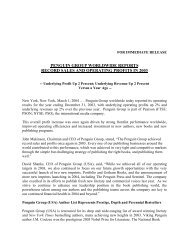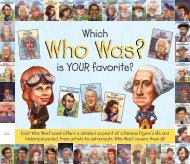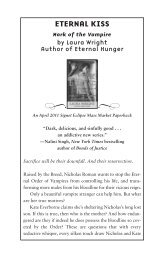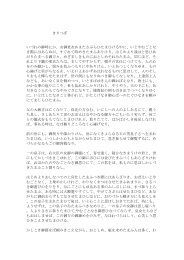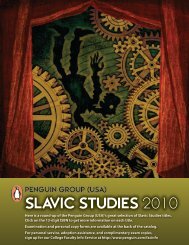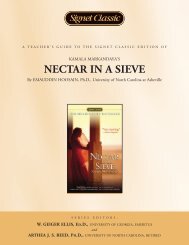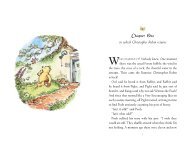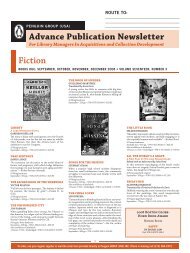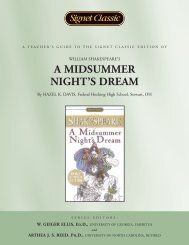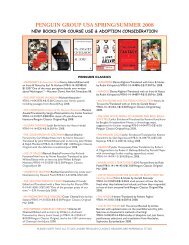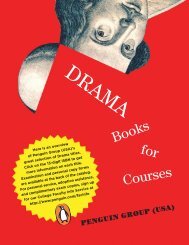Christopher Marlowe's Doctor Faustus - Penguin Group
Christopher Marlowe's Doctor Faustus - Penguin Group
Christopher Marlowe's Doctor Faustus - Penguin Group
You also want an ePaper? Increase the reach of your titles
YUMPU automatically turns print PDFs into web optimized ePapers that Google loves.
32<br />
CD INSERT<br />
A Teacher’s Guide to the Signet Classics Edition of <strong>Christopher</strong> Marlowe’s <strong>Doctor</strong> <strong>Faustus</strong><br />
In this activity, students design a modern CD insert for the soundtrack of <strong>Christopher</strong> Marlowe’s<br />
Dr. <strong>Faustus</strong>. Inserts include cover and other artwork, lyrics, and producer’s notes. Songs can be<br />
classical or contemporary. The “producer’s notes” are actually student analysis, explaining why each<br />
song fits a specific scene, theme, or mood from Marlowe’s play, thereby justifying its selection.<br />
For extra credit, students can burn their own CDs and present them for class listening. Inserts are<br />
assessed on analysis, effort, and design.<br />
EXTENDED READING<br />
<strong>Christopher</strong> Marlowe’s Dr. <strong>Faustus</strong> raises significant questions about the benefits of magic, the<br />
complexity of good and evil, and the nature of desire.<br />
Ask students to read one short story, one play or novel, and watch one film that depicts the passage<br />
from innocence, through conflict, to redemption/condemnation as the protagonist is willing to<br />
pay the ultimate price for his ambitious aims. Students can make a comparison chart depicting the<br />
similarities and differences between the character and Dr. <strong>Faustus</strong>.<br />
Students should also consider the following questions as they read/view:<br />
1. What character traits depict the protagonist as a hero?<br />
2. Does this character illustrate a moral code? If so, describe it.<br />
3. What is the character’s greatest desire?<br />
4. What ultimate price is the protagonist willing to pay to reach his/her objective?<br />
5. Detail the outcome of the hero’s “bargain.”<br />
6. Does the protagonist regret his/her decision? How do you know?<br />
7. Does the character learn a lesson as a result of his downfall? Describe this lesson.<br />
8. Is the protagonist ultimately redeemed or condemned for his/her choices?<br />
The following titles focus on themes of magic, good versus evil, ambition, and Faustian bargains,<br />
and are excellent for independent reading or literature circles where each group of students read a<br />
different work on the same theme.<br />
Benét, Stephen Vincent. “The Devil and Daniel Webster.” The Devil and Daniel Webster and<br />
Other Writings. New York: <strong>Penguin</strong> Classics, 1999.<br />
Carroll, Lewis. Alice’s Adventures in Wonderland and Through the Looking Glass. New York:<br />
Signet Classics, 2000.<br />
Coelho, Paulo. The Alchemist. San Francisco: Harper, 1995.<br />
The Devil Wears Prada. Dir. David Frankel. Fox, 2006.<br />
Irving, Washington. “The Devil and Tom Walker.” Complete Tales of Washington Irving. Da<br />
Capo Press, 1998.<br />
Lewis, C.S. The Lion, The Witch, and the Wardrobe. New York: Harper Entertainment, 2005.<br />
The Little Mermaid. Dirs. Ron Clements and John Musker. Disney, 1989.<br />
Milton, John. Paradise Lost. New York: Signet Classics, 2001.<br />
Pullman, Philip. The Golden Compass. New York: Knopf Books, 1996.<br />
Rowling, J.K. Harry Potter and the Sorcerer’s Stone. New York: Arthur A. Levine, 1998.<br />
Shakespeare, William. Macbeth. New York: Signet Classics, 1998.<br />
Star Wars: Episode III – Revenge of the Sith. Dir. George Lucas. LucasFilm, 2005.<br />
Stevenson, Robert Louis. Dr. Jekyll and Mr. Hyde. New York: Signet Classics, 1994.<br />
White, T.H. The Once and Future King. New York: Ace, 1996.





